Our friendly analyst has shared some thoughts with us following the Forestry Panel’s stakeholder meeting on the 10th July. Particularly focusing on the written ministerial statement from the Secretary of State Caroline Spelman. You can read the ministers’ statement with our comments attached here: Caroline Spelman – Written ministerial statement, Forestry Panel Report – What she really meant
A couple of weeks ago I brought together a group of people from around the country who were stakeholders in my area of work. As ever I found it as both a humbling and stimulating day. Humbling because I am always amazed at the enthusiasm and commitment I see from people working at ground level and stimulating because there is always a buzz of excitement and lots of ideas of things we should do and areas that we should explore. But as the person accountable for delivering results in this area the big question for me is how I turn all of that enthusiasm to my advantage and get it to harness real results that make a real difference in the long term.
The National Stakeholder Event on 10 July was just like that; it feeds on the enthusiasm of the already committed and generates a momentum for activity. It was great because it confirmed the commitment of all those concerned about our forests, increases their enthusiasm and allows them to develop a common understanding. But it is only part of the picture of what happens next. Feedback from the meeting was almost universally positive; people got the impression that the Secretary of State was genuinely contrite about her handling mistakes and positive about the report. But it is the Written Ministerial Statement (WMS) that is the most important commitment so far; that’s analysed elsewhere, and most of the reports of the meeting don’t suggest the Secretary of State has gone beyond that. But there are 4 issues worth picking out from the meeting:-
- The establishment of the “National Forestry Stakeholders” forum,
- The commitment to legislate if necessary,
- The continued floating of the community ownership option, and
- The complete absence of any reference to the ‘Private Forest Estate’.
National Forestry Stakeholders Forum
This is clearly to be welcomed; but there are a couple of points to watch. First the way I read the reports is that there has been something like this before; but the official report on the Panel’s webpage says that it is new. We will need to look at its terms of reference and proposed composition. I would be concerned if it focused on a small number of big players (National Trust, Woodland Trust, RSPB, Wildlife Trusts) but conversely it is a common tactic to dilute the impact of a forum by making them very wide so that any messages are swamped by the noise. I was interested to find a Forestry Commission stakeholder shortlist for organisations with an interest in the PFE[1]. I can’t see the metadata for this document and it is unsigned and undated but it is interesting to see it included none of the organisations like SOW and HOOF yet it does include Stonewall.
And before we assume that things have moved on from when this document was created and that the inclusion of SOW and HOOF in the Panel’s stakeholder meeting let us reflect on what the WMS actually said and ask ourselves how many of these would be ‘organisations’ for the purposes of the new National Forest Stakeholder Forum. I run a stakeholder panel in my business and I am ruthless at excluding representatives who cannot demonstrate that they represent a significant group of people. Of course I am quite willing to guarantee one pound if we need to set up a company limited by guarantee to formalise our structure.
The Commitment to legislate
I understand that, when responding to questions from the floor, the Secretary of State said that if it was necessary to legislate then she would. While this sounds positive it can read to mean that the government will not legislate unless there is absolutely no other way to do what they want; and I think that this is a much more accurate description of their position. Space on the legislative timetable is extremely tight and Departments, and Ministers, battle to get some of it for themselves. Only the Treasury has the luxury of an annual bill – the Finance Bill – with everyone else scrabbling for legislation to the changes they want.
And we know that to do a proper job in relation to Part D of the Panel’s report we would need to see legislative changes so we will need to see fudge and muddle as the way in which she will try to give the appearance of modernising the way FC administers the Public Forest Estate. What we are unlikely to see is changes to the ownership of the estate; which will still leave it at the whim of politicians. Perhaps one of the reasons why they are not keen to change the ownership is that they would quite like to keep this under their control.
This is an area that deserves more work; particularly because the announcement on 12 July that all of the nation’s public waterways were being transferred to a new body, the Canal & River Trust, and that the trust will take over the functions of the Government Body – British Waterways. And it is interesting to see that their purpose is “To act as guardian for the canals and rivers of England and Wales”. I have yet to hear the equivalent promised in relation to our Public Forest Estate. The legislation for that huge transfer was done in the Public Bodies Act 2011 where the original Bill contained provisions, subsequently removed, to allow the Secretary State to do almost anything she wanted with the Forestry Commission.
We should not give up having a clear new structure for forest ownership and structure.
Community Ownership
I think that continued questions about local ownership, where I think it was raised both from the podium and in table discussions means that Government continues to hanker after the sort of local acquisition or management of woodlands that was envisaged in the passage of the Localism Bill. We have already seen Lord Redesdale’s risible attempt at putting together a tripartite vehicle to acquire and exploit Kielder Forest[2] (you just wouldn’t start there) but it really looks like this idea has not been nailed by the Report.
You could argue, and the Secretary of State may well try, that by returning forests to community ownership that are actually owned by the public; and much closer to the people that care about the forests than could be achieved by central ownership by the State. Would we agree with this?
I was interested to see that, on the FC website, links to England’s “Community Forest”. These pages may always have been there, and links in place from Government websites; but they look to have been given new prominence. We also know that when the original consultation started on the fate of the Public Forest Estate in England the ‘big’ organisations like National Trust, Woodland Trust and RSPB were earmarked as organisations which could take forests off the Government’s hands. And local groups and the Wildlife Trusts in particular were thought as another home for smaller blocks of wood, either to own or to manage as nature reserves without a strain on the Government’s finances. You may remember that the Prime Minister’s comment about this fiasco (and the negative reaction of the big organisations in particular) was that there had been “… insufficient pitch-rolling …” – i.e. insufficient preparation done with the key opinion formers.
And now we have a 6 month pause in action while the Government considers its response and the re-emergence of the “National Forest Stakeholder Forum”. Need I say more?
What about the ‘Private Forest Estate’?
My great disappointment is in the lack of vision in relation to the ‘Private Forest Estate’; those woodlands that are privately owned and not within the Public Forest Estate. We know that, compared to the Public Forest Estate these woods are often not in good management. The Report also demonstrated that all the benefits of forests and woodlands would only come when they were under good management and it then suggested, and bless them for this, that the management practices of the Public Forest Estate should be transferred into the Private Forest Estate by a creation of a new Forest Services Agency that would spread good Public Sector practice into the Private Sector for our mutual benefit.
Did I miss the reference to this in the meeting; there’s certainly no mention of it in the Secretary of State’s WMS. And thinking about its absence, I would not be surprised if the direction of travel intended by the Secretary of State, and DEFRA, was to reduce the size, and cost, of Forestry Commission, and Forest Enterprise in particular, and this fits with the references in the WMS to needing to bring in private funding for the management of the Public Forest Estate. I would only be surprised at the absence of a reference to this recommendation if the Secretary of State, and DEFRA, were interested in improving the contribution that all forests make to the life, wellbeing and economy of England.
So where next?
We will need to work at a number of levels.
All of us need to confirm our commitment to our woods and forests and to keeping them publically owned for our collective benefit.
Those who work with, in or around woodlands need to work together to ensure that they are seen to deliver the sort of benefits that the OFP report and to make the steps called for in Parts C1 to C3.
We need to ensure that our voice is heard through forums like SOW and HOOF and not just through the big players like the National, Woodland or Wildlife Trusts and RSPB or through the specialist lens of the Ramblers or Cyclists.
We need to hold Government to account in relation to the spirit of the report and not let then retreat to the wording of the Secretary of State’s WMS.
We will need to look closely at each step that Government takes and analyse its fit with our objectives. And we will need to look for realistic ways to achieve what the report wants by way of a new structure that does not simply fudge the issues for another generation,
And we need to stay enthusiastic about our woods and forests; they will be there a lot longer than the politicians will!













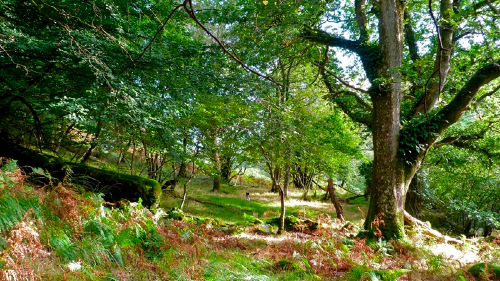
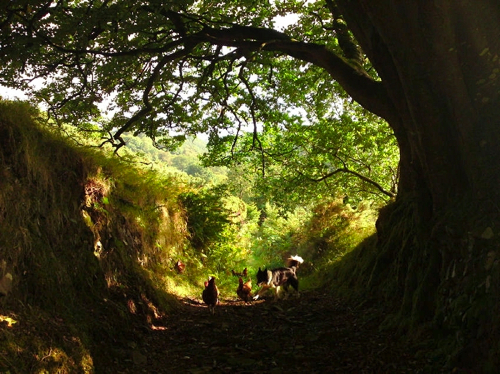
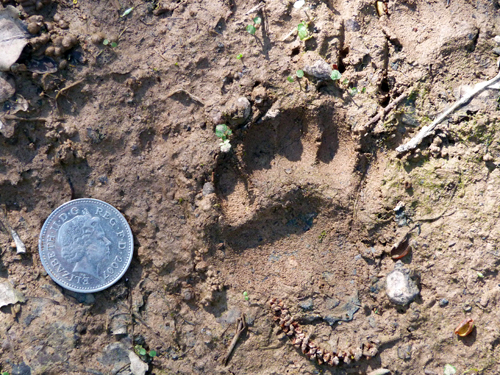

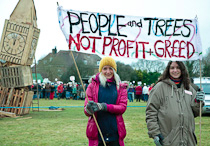


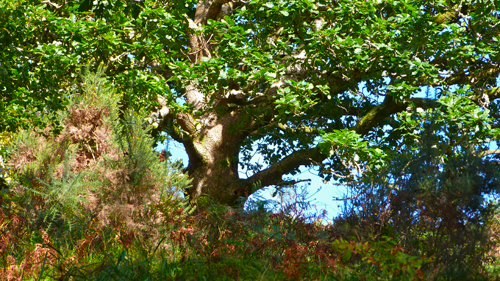

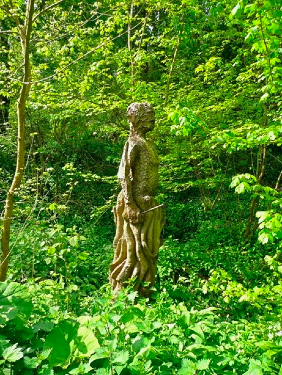
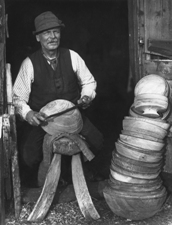



As the practitioners have been left largely out of the picture, hardly ever even considered as a stakeholder, the need for “Those who work with, in or around woodlands need to work together to ensure that they are seen to deliver the sort of benefits that the OFP report and to make the steps called for in Parts C1 to C3.” has to be given a platform which truly interacts with those in the industry. The private sector, whilst represented by the ICF, has been further disenfranchised by the whole affair and particularly by an over dominance of NGO presence and input. How to reconnect those who can actually achieve what is desired – and in particular the Arboricultural fraternity – will be the realisation of the reports recommendation. In many respects practitioners & contractors and the public are now one and the same as a result of the forestry panel process – this is yet to be proven to be a good or bad thing overall. But it is certainly not a good position for the NGO ‘stakeholders’ to be in whether they think so or not.